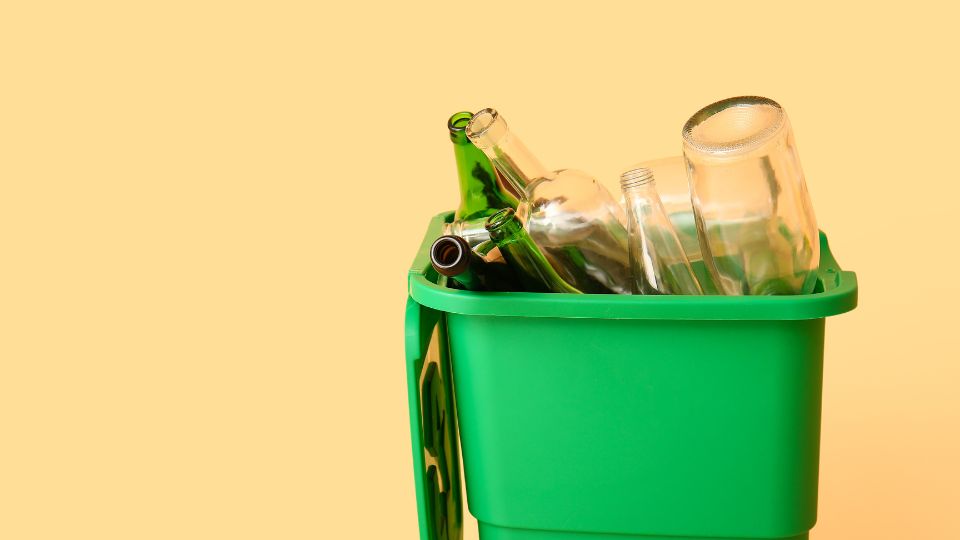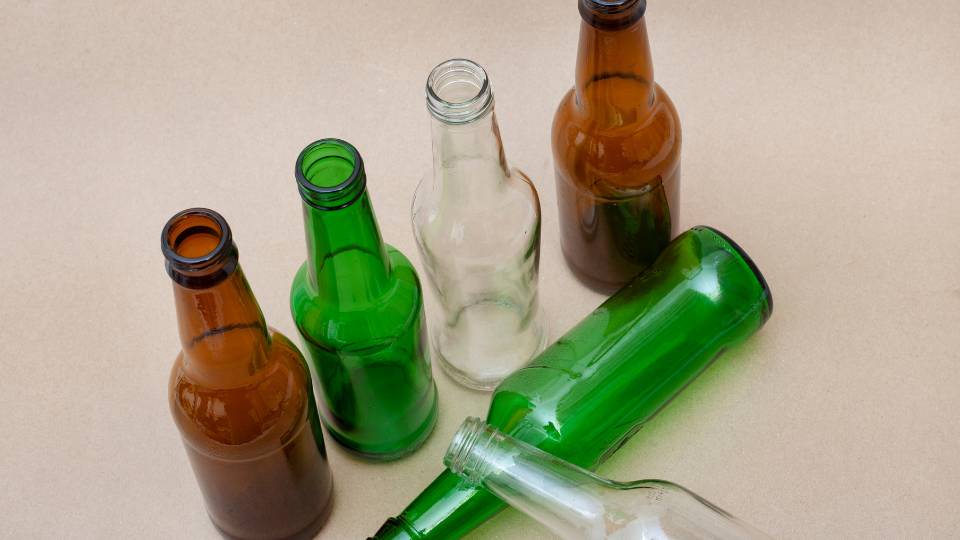
Glass is essentially infinitely recyclable, it’s also really simple to produce with a wide variety of materials.
It may be heavy when compared with other recyclables that serve the same purpose, resulting in more fuel emissions & space required for transportation.
By following the guidance below you can ensure that your glass waste is recycled properly without causing any cross-contamination or accidentally making a common mistake which leads to it being sent to landfill.
Table of Contents:
- What is commercial glass waste recycling?
- How is glass recycled? – Glass recycling process
- Environmental Advantages of Glass Recycling
- Energy Savings and Carbon Emission Reduction
- Types of Glass Suitable for Recycling
- Challenges and Solutions in Recycling Different Glass Types
- Large-Scale Glass Recycling Sites
- Is glass more eco-friendly than plastic?
- Can you put normal glass in recycling?
- Glass recycling facts and statistics
- How to Reduce Glass Waste as a Business

What is commercial glass waste recycling?
Commercial glass recycling is the process of taking your businesses’ glass waste, crushing and melting it, and finally remoulding it back into useful glass products.
If you’re a restaurant, for example, your empty beer, wine, and soft drink bottles will be collected by your waste collector and taken to a treatment facility (making sure your glass bottles don’t get mixed with your other waste types on the way).
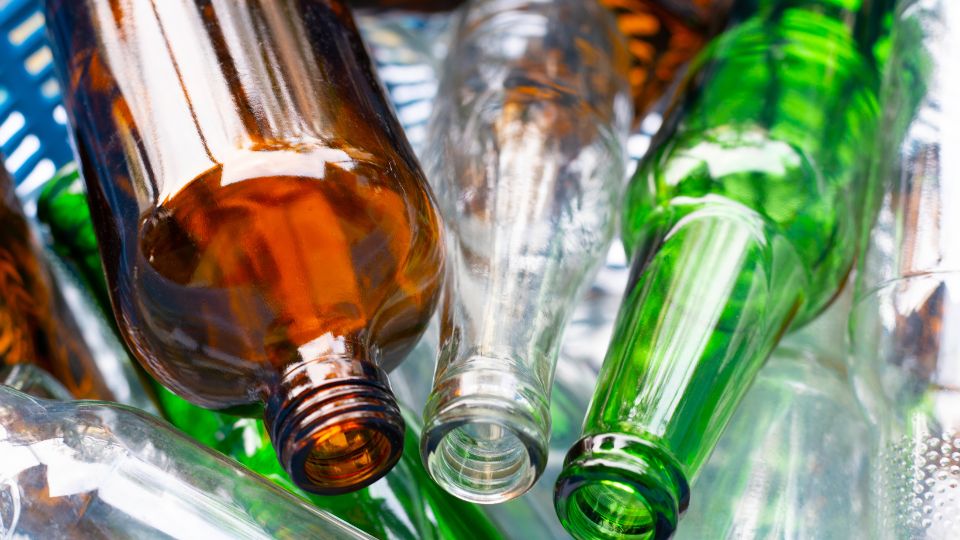
The treatment facility will then crush the bottles into small fragments called cullets. Then they’ll wash them and remove any drink residue or sticky labels.
Following that they’ll melt down the cullets and place the molten glass into moulds to create new drinks bottles.
This recycling process is so efficient that, if done correctly, effectively 100% of your glass waste can be recycled into new products.
How is glass recycled? – Glass recycling process
Glass is recycled in a 3-step process.
First, it’s collected from your business sight and delivered to a treatment facility (transportation stage), then it’s sorted, crushed, and cleaned (cullet stage), and finally, it’s melted down and remoulded into new products (reproduction stage).
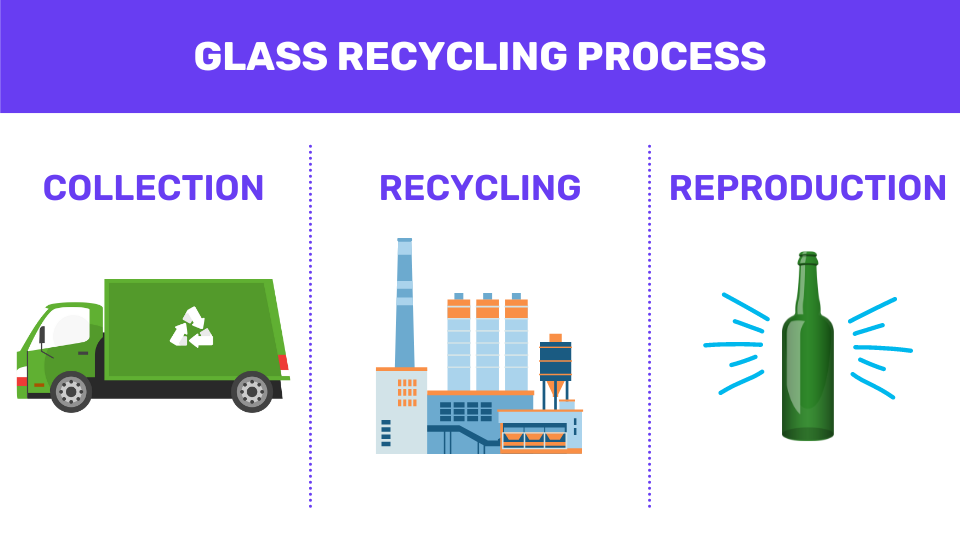
Environmental Advantages of Glass Recycling
Resource Conservation
In the UK, companies like Ardagh Group have been recognised for their commitment to glass recycling.
Ardagh’s glass packaging solutions contribute significantly to the circular economy, reducing the need for raw materials.
By recycling glass, companies help conserve natural resources such as sand, soda ash, and limestone, which are essential for glass production.
Reduced Landfill Impact
The Reuseful UK network promotes the reuse of glass bottles in various creative ways, reducing the volume of glass ending up in landfills.
By diverting glass waste from landfills, recycling reduces the environmental impact and helps in achieving waste reduction goals.
Energy Savings and Carbon Emission Reduction
Lower Energy Consumption
British Glass highlights the energy-saving benefits of glass recycling.
Recycling glass requires less energy compared to manufacturing new glass from raw materials.
For every ton of recycled glass used in production, energy consumption is reduced by around 20%, leading to a substantial decrease in the carbon footprint of glass products.
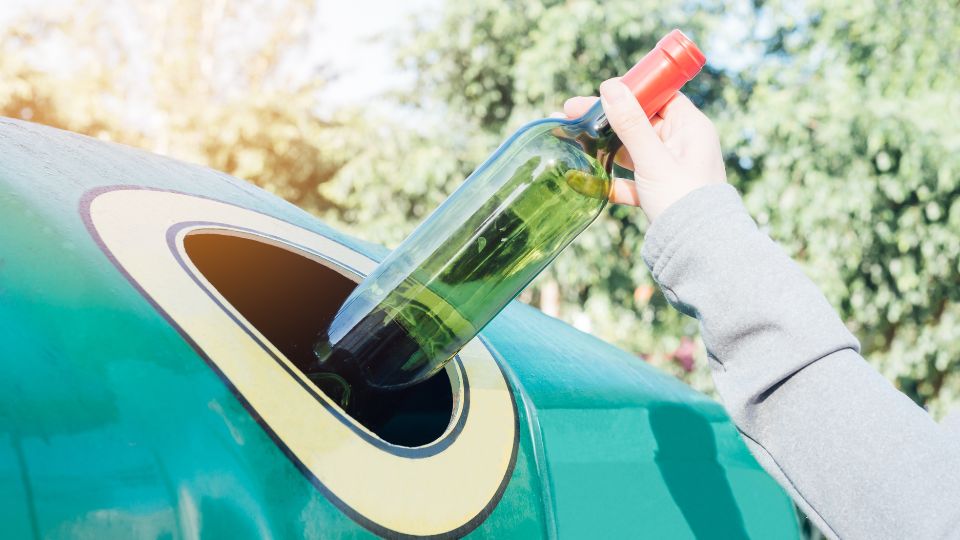
Types of Glass Suitable for Recycling
Clear Glass
Clear glass is highly recyclable, and frequently repurposed to create new clear glass containers due to its transparency.
This characteristic simplifies the recycling process, allowing for the production of high-quality recycled clear glass.
One primary challenge lies in avoiding contamination from coloured or treated glass. Effective sorting technologies and educational initiatives are pivotal in bringing down such contamination and ensuring the integrity of the recycled clear glass.
Coloured Glass
Coloured glass, encompassing shades like green, brown, and amber, is extensively recycled, typically reused to manufacture new containers of corresponding colours.
While coloured glass contributes significantly to sustainable packaging solutions, sorting mixed-coloured glass poses challenges.
Advanced sorting technologies, including optical sorting machines, play a crucial role in efficiently separating different coloured glasses, and enhancing the quality of recycled glass.
Specialty Glasses
Speciality glasses, such as heat-resistant or lead glass, present distinctive recycling challenges due to their unique compositions.
Although recycling is possible, it necessitates specialised processes. For heat-resistant glass like Pyrex, adjusting temperature and processing conditions is essential.
Recycling lead glass requires meticulous separation and treatment to prevent contamination within the recycling stream.
Challenges and Solutions in Recycling Different Glass Types
Contamination
Contamination, characterised by the presence of ceramics, plastics, or non-glass materials, poses a significant challenge to the quality of recycled glass.
To address this issue, advanced sorting technologies such as air classifiers and vibrating screens are employed during recycling.
Simultaneously, education and awareness initiatives are critical in reducing contamination at its source.
Mixed Glass Recycling
Processing mixed glass, combining clear and coloured glass in a single recycling stream, can result in colour contamination, impacting the quality of recycled glass.
Adopting dual-stream or multi-stream collection systems, where clear and coloured glass are collected separately, proves effective in minimising colour contamination and streamlining the recycling process.
However, most recycling collectors now offer mixed recyclable waste bins.
Material from these bins is processed by newer, more advanced technologies which can intelligently separate different coloured glass types.
Recycling Non-Bottle Glass
The recycling of non-bottle glass, including glass cookware, mirrors, and windows, presents challenges due to varying compositions and melting points.
Specialised processing units equipped to handle non-bottle glass, combined with technologies like thermal treatment or crushing and melting at specific temperatures, facilitate the recycling of these diverse glass items.
Downcycling Concerns
Downcycling, wherein recycled glass may be repurposed into lower-value products due to contamination or impurities, is a pertinent concern.
Maintaining high-quality standards through efficient sorting processes during recycling helps mitigate the risk of downcycling, ensuring that recycled glass retains its value in the production of new, high-quality glass products.
Large-Scale Glass Recycling Sites
Strategic Recycling Infrastructure
The Recresco glass recycling facility in South Kirkby, West Yorkshire, is a prominent example of a large-scale recycling site in the UK.
Facilities like Recresco play a vital role in processing vast amounts of recycled glass, ensuring it is sorted and ready for reuse in various industries.
Landmark Recycling Achievements
The Berrington Hall National Trust Property undertook a glass recycling project as part of its sustainability efforts.
By successfully recycling large quantities of glass on-site, they not only reduced their environmental impact but also set an example for heritage sites and historical buildings.
Is glass more eco-friendly than plastic?
On the surface, glass is one of the best eco-friendly container products in the world when it comes to recycling – far better than plastic in that regard.
However, due to the glass being heavier, the overall impact on the environment when you take into account things like transportation costs is slightly worse for the planet.
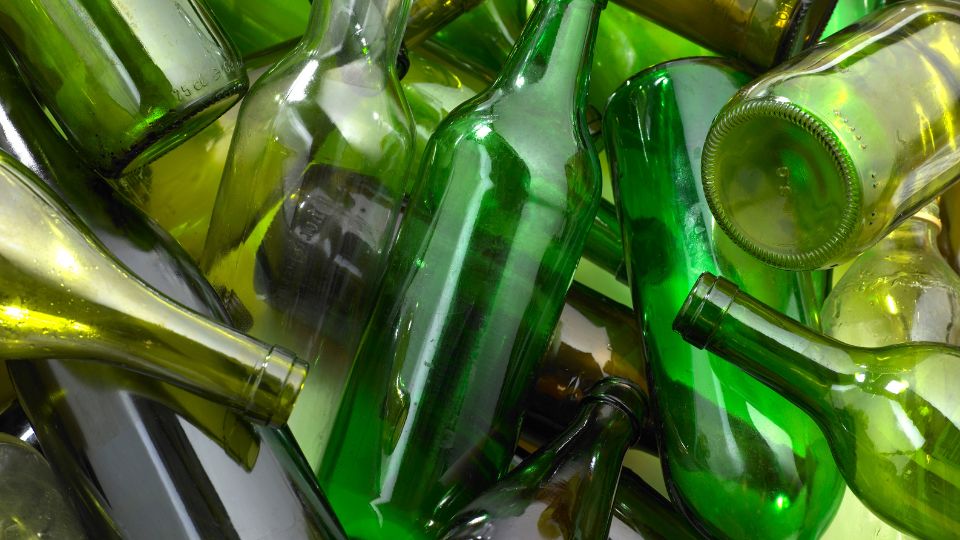
Glass can be recycled with 100% efficiency due to its simplistic chemical structure which is great news. But because it’s heavy, inflexible, and prone to damage it can be a burden on the environment in real terms.
Whereas, plastic, in general, is a lot more difficult to recycle efficiently. This is because many plastic products are made up of various polymers and components.
This means that melting points are rarely the same from one plastic product to another so the recycling process becomes difficult.
However, due to plastic being far more flexible, durable, and lighter its overall harm to the planet is shockingly less than that of glass!
Can you put normal glass in recycling?
Many glass items you regularly throw away can be recycled such as jars and bottles (without their lids and caps). But other glass products such as lightbulbs, drinking glasses, and Pyrex can’t be recycled in the normal way since they are designed to withstand high temperatures.
Ceramic items are also often mistakenly thrown into commercial glass bins. These can’t be recycled under the same process as glass bottles and jars either.
Types of glass you can typically recycle
- Bottles
- Jars
These will need to be without lids/caps and can be any colour whether that’s clear, brown, green, amber, or blue.
This didn’t always use to be the case and glass waste had to be separated by colour. But with modern recycling technology, this is no longer a problem.
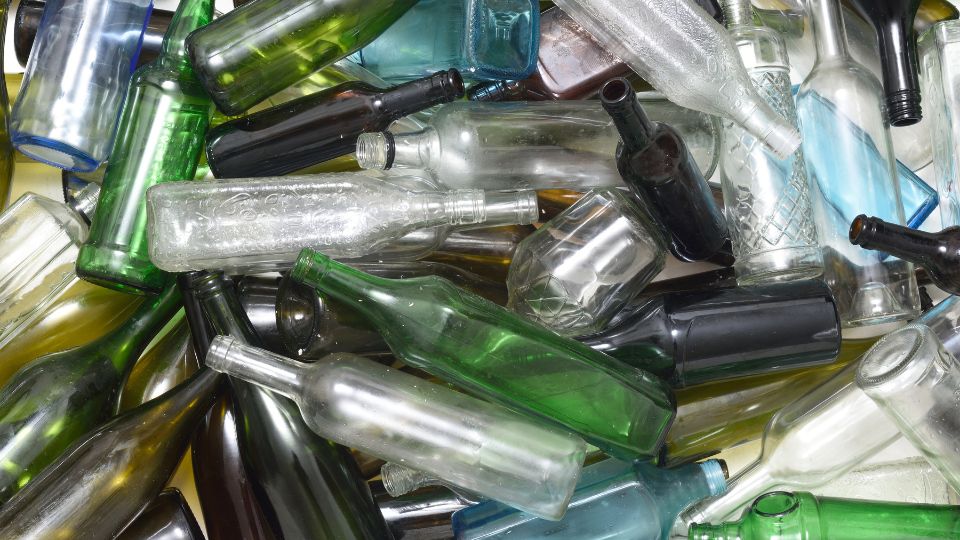
Types of glass you can’t recycle without specialist processes
- Glass mixed with other non-glass materials
- Decorated glass products
- Dirty glass or glass caked with food waste
- Mirrors
- Ceramics/dishware
- Pyrex and oven glass
- Window glass
- Light bulbs
Most businesses, especially those in hospitality won’t need a specialist recycling service for these materials and standard collection service for empty bottles and jars is far more common.
Glass recycling facts and statistics
- Glass can be endlessly recycled without losing its quality or integrity
- In the UK, glass has a 76.5% recycle rate – meaning that three-quarters of all glass is recycled
- Around 1 tonne of natural resources are saved for every tonne of glass that is recycled
- Over the last 30 years, glass bottles have had their weight reduced by 40%
- Every tonne of glass recycled saves 246 kilograms of CO2 emissions
- It would take about 1 million years to decompose glass in landfill fully.
- 200,000 tonnes of recyclable glass is unfortunately sent to landfill each year
- For every 100,000 tonnes of glass recycled, 500 jobs are created
How to Reduce Glass Waste as a Business
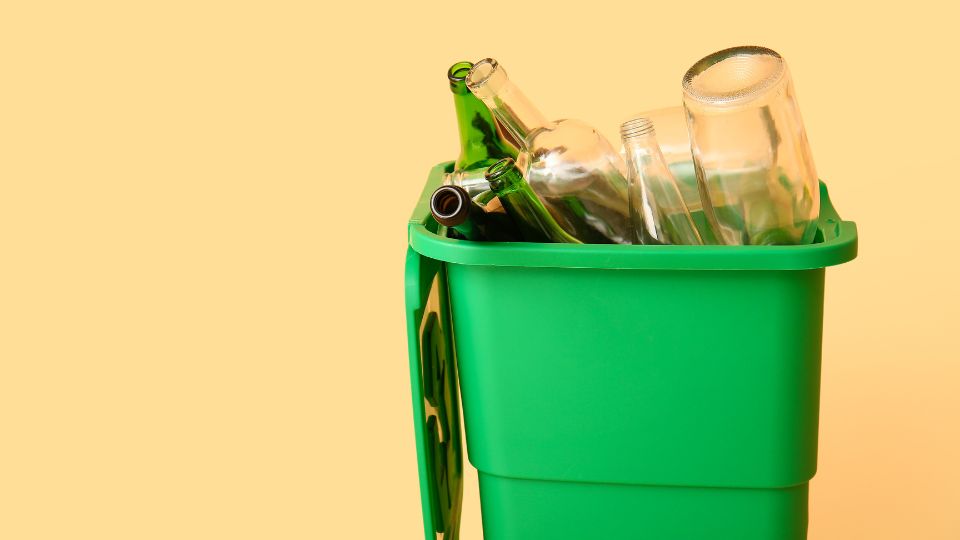
Many businesses, from pubs and restaurants to offices and garages, create glass waste daily. While some glass waste is inevitable, there are effective ways to reduce it.
Whether running a restaurant, managing an office, or working from home, these strategies can help reduce glass waste and improve your business’s sustainability efforts.
Reuse and Upcycle Glass in the Office
One of the best ways to reduce glass waste is by reusing and upcycling. Restaurants and bars often repurpose wine bottles as table decorations or candle holders, but offices can do something similar.
Empty glass jars and bottles can be used for storage, such as for holding pens or office supplies, adding creativity while reducing waste.
Promote Health and Safety to Avoid Breakages
Breakages are a significant source of glass waste in offices, factories, and other workplaces. Minimising accidents through proper health and safety measures can significantly reduce the amount of broken glass that needs to be discarded.
Ensure clear walkways and train staff on handling glass items to prevent drops and breakages.
Invest in Efficient Technology
For businesses that handle glass, investing in modern technology can reduce waste. Industries that produce glass products, such as manufacturing or retail, can benefit from machinery that ensures precise cutting and handling, minimising offcuts and excess waste.
Donate or Recycle Unwanted Glassware
When upgrading office supplies or facilities, consider donating old glassware to charities or community organisations.
Many groups will gladly take old glass items for resale or use, reducing waste and allowing those products to be repurposed.
Set Up Glass Recycling Bins in the Office
Glass is one of the most sustainable materials to recycle because it can be recycled infinitely without losing quality.
While it’s not always possible to eliminate glass waste, recycling is a key solution to prevent it from ending up in landfills.
Set up glass recycling bins in office kitchens, break rooms, and other areas where glass is commonly used. Encourage staff to separate glass waste and ensure it gets recycled properly.
Recycling Glass When Working From Home

With more employees working remotely, it’s important to extend recycling efforts to the home office. Here’s how to recycle glass while working from home:
- Set up a home recycling station: Create a dedicated space for separating recyclable materials, including glass. Having a clearly labelled bin for glass will make recycling easier.
- Repurpose glass jars: Instead of discarding glass jars, use them for home office storage, such as for holding pens or small supplies.
- Utilise local recycling programs: Check with your local council for glass recycling programs, including collection services or drop-off points.



